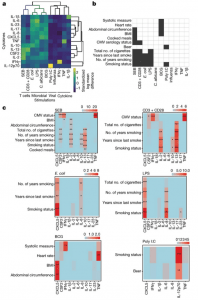You already know smoking harms your lungs, but did you know it might also leave a lasting mark on your immune system, even after you quit? A recent study reveals a “long-term memory” of how smoking weakens your body’s defences, highlighting its far-reaching consequences (Figure 1).

Figure 1: Variables associated with cytokine levels in diverse immune stimulations. a, Standardized log mean differences of 13 cytokines in 12 immune stimulations. b, Significant associations (Benjamini–Yekutieli adjusted P value of likelihood ratio test (LRT) < 0.01) of variables with at least one induced cytokine for each immune stimulation are coloured in black. c, Heat maps showing −log10(Benjamini–Yekutieli adjusted P value of LRT) for the eCRF variables associated with at least one cytokine in each stimulation (Benjamini–Yekutieli adjusted P value of LRT < 0.01). *P < 0.05, **P < 0.01, ***P < 0.001.
We know age, sex, and genetics play a role in immunity, but researchers wanted to dig deeper. They looked at 136 different factors, from sleep habits to childhood illnesses, to see which ones most impacted immune responses.
Three factors emerged as major players: smoking, a specific cytomegalovirus infection, and body mass index. Smoking’s impact was particularly concerning, potentially equalling the influence of age, sex, or genetics.
The study revealed two ways smoking harms immunity:
- Inflammatory Overdrive: Smokers showed an exaggerated inflammatory response, the body’s initial attack against pathogens.
- Memory: Smoking also affected cells crucial for immune memory, which helps the body recognize previous pathogens.
While the study raises concerns, it doesn’t mean the damage is irreversible. More research is needed but understanding this “long-term memory” is a critical step. It could pave the way for personalized approaches to help smokers heal their immune systems, even after quitting.
This is just one study, and further research is needed. However, it emphasizes the importance of quitting smoking early and taking care of your overall health for a strong immune system.
Journal article: Saint-André, V, et al. 2024. Smoking changes adaptive immunity with persistent effects. Nature.
Summary by Stefan Botha










